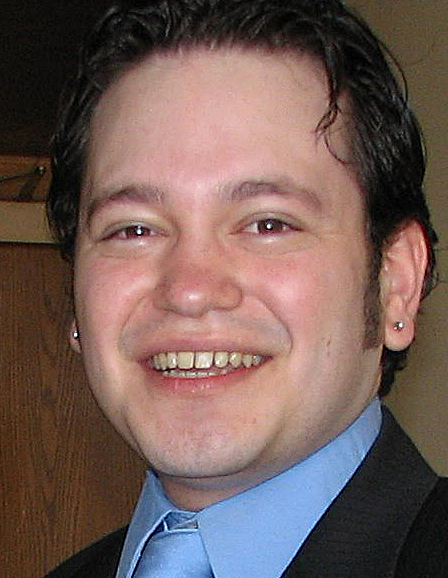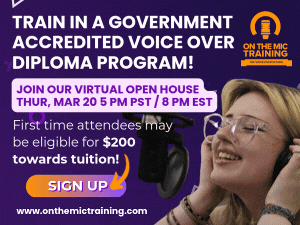|
VOICE ACTING Abandon The 'Tricks' And Honestly, Emotionally Connect With Listeners  By Juan Carlos Bagnell By Juan Carlos BagnellAudio Engineer aka "Some Audio Guy" "I try to talk to one person.” I hate this trick. There. I said it. This is probably the most bulls**t piece of advice we give new voice actors. It's a lazy, overly simplistic, one-size-fits-all
nugget, and it's a coin flip whether or not it'll work in an actual
casting or booked session.
On its face it sounds like good advice, but the main problem I have with it is that we rarely equip voice actors to understand the "why" of it. Why do we want you to speak to one person? I'll tell you. It's because we want you to create an emotional response
or relationship with the person listening to the performance. That's
why, but you'll rarely hear anyone articulate that. THE 'THROW AWAY' To sell soap, you
have to get someone to care (primary reason I hate the direction "throw
it away" and never use it). From a performance perspective, it's a
feel-good, method-y way to get newbie performers to think about their
performance. Great. It is not in and of itself a performance foundation. It is a trick. We're trying to distract voice actors away from the words on the
commercial copy page, and trick them into delivering an emotionally
connected read. In my opinion this approach - free of experience and a
background in other methods of performance - will fail more often than it
succeeds. IMAGINING THE WRONG AUDIENCE First off, I often find that the actor's audience selection is usually wrong. During a recent one-on-one coaching, I was working with an actress on a
piece of health care cop, about getting preemptive screenings. Each
read was more antagonistic than the last, and all were at odds with the
copy's direction of "caring," "concern" and "empathy." When I asked
what was motivating her reads, she said she was talking to her sister. HOW CONCERN BECOMES NAGGING On playing back her takes, she was shocked to hear how nagging-ly she
had delivered the copy, when in her mind - and heart - she genuinely cared
about the audience she had selected. I think it was also a telling
psychological peek into the nature of their relationship. The idea that we each honestly have a unique person in our lives that we
can pick as an audience for every piece of copy we read is unrealistic
at best and self-destructive at worst. The idea that we have to walk
into every audition carrying that level of personal emotional baggage is
exhausting. HURTING THE COPY The other problem suffered is the copy. We don't speak to each other "commercially." If you've ever had to
audition a wall-to-wall 60-second radio spot, you know we just don't relate to
each other that way as humans. FACE THE TRUTH Face it. You've never been motivated to share a brand's message in an
energetic and entertaining way, without sounding announcer-y, while
using language like "introducing" or "presenting." So why do we still hide behind the conceit that an audience of one is going to help? I get it. It's a way to shut up a question on performance, without the
person feeling like their concerns were disregarded, and leaves the
actor feeling like they've received some kind of sage advice. But the truth of the matter, the peek behind the curtain, is that most of the
successful commercial voice actors I work with don't do this. WHAT GOOD VOICE ACTORS DO They
simply don't consciously pick one person they know in real life to talk
to during a commercial read. It. Just. Doesn't. Happen. So what advice do I have for informing a commercial read? You're probably not going to like it. THE KEY TO SUCCESS It takes time. Seriously. Use the trick as a starting point if you must,
then over a period of time abandon it. Inform your own technique with
experience, but run away from the audience trick as soon as you're
capable. I'm a big fan of Malcolm Gladwell, and I genuinely do believe in his 10,000 hours to mastery hypothesis posed in his book "Outliers." AN INNATE VO ABILITY The master voice actors I've worked with - those seasoned by time,
effort, and experience - have all adopted a far more intuitive approach
to their individual reads. Often it seems they're developing an idea of
their delivery before they've finished reading the copy, before they've
even bothered to read the producer's direction, and before they're
rationally analyzing the copy. They've been exposed to so much copy that the script analysis and
performance sections of their brains can function almost autonomously. GET THAT FEELING It's a "feeling" based approach to VO we rarely discuss with up-and-coming VOs. They've also taken the time to calibrate their instruments. Again, an intuitive sense of:
"When I feel like this, people listening will feel like that." NO GUESSING GAMES NEEDED They are never guessing about the emotional impact they're creating.
They don't have to reference their reads after the fact to see if
they've achieved the proper tone. They feel it when it works, and they
know when they've missed it. Rather than perfecting a trick, we should want to get to this emotional
short hand. CUT OUT THE MIDDLEMAN We want to cut out the middleman, and that can only be
achieved with time and practice. Give it 10,000 hours of intense study
(give or take a year or so). For all the people I've taught, coached, and worked with, especially
those only a couple of years into their voice over journey, this is
almost always the leading issue I find with people who feel like they've
plateaued. Techniques, methods, and tricks are just the beginning. They are
training wheels. Use them to find your balance, but eventually you must
forge your own path. ABOUT JUAN ... Juan Carlos Bagnell, aka "Some Audio Guy," is a veteran audio engineer who writes a highly entertaining and informative blog: Ramblings of Some Audio Guy. Blog: http://someaudioguy.blogspot.com Email: someaudioguy@gmail.com |
For essential voice-over business strategies
On Michael Langsner's Voice-Over Roadmap Podcast
Email alerts to new VoiceOverXtra articles
With Sean Daeley and Paul Stefano - check it out!
As of the NEW website launch, 03/22/2012










That's where the emotion lies.
Thank you for your insightful handling of a very difficult topic...
how to improve, gracefully!
It seems like practice and time invested is the pathway to success. I appreciate your candor and guidance in focusing my efforts.
Ken
Intuition is only a start - a good one, but those 10,000 hours, spent well, nail that intuition. I may tell new voiceover students to "talk to one person" when they first begin, only when they need to get off "stage" and and into the room. So many are in "second balcony theatre mode" at first. But, after that, there is so much more to believability (yes, using words written in a way that seldom reflects actual human speech) than picturing your listener specifically.
10,00 hours - so true. Love Gladwell's book!
Thanks,
Randye
Every generalization is a lie (including this one). Besides, I've never been a big fan of the word "try." You either do something or you don't.
The tip "Talk to One Person" comes out of the book "Quick Fixes and the Art of Feigning Sincerity."
The problem in voice acting is that we have to please many masters. Let's look at a national commercial. Whom do we have to please?
* The shareholders and Board of Directors of the client
* The client
* The head of advertising and marketing of the client
* The ad agency that was hired by the client
* The director that was hired by the ad agency
* The focus groups that are first exposed to the campaign
* A national audience made up of millions of unique individuals with different needs, hopes, dreams and preferences
Here's the problem: we're always talking to one person and we're never talking to one person.
Sincerity can't be faked, talent can't be bought and intuition is not for sale at K-Mart.
Intuition comes with experience; talent comes from nature and can be nurtured. Sincerity starts when we stop pretending.